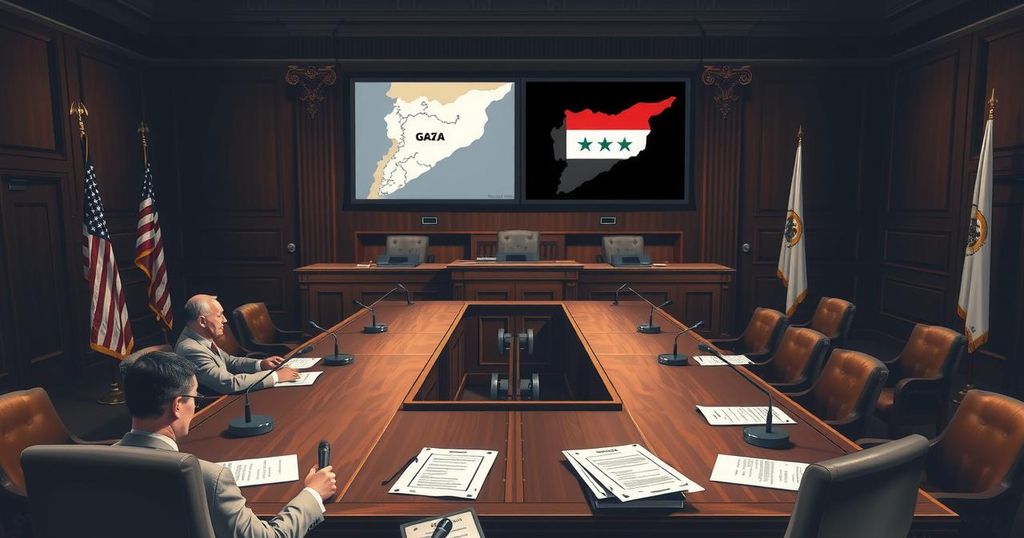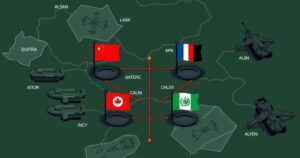Rubio Addresses Gaza, Iran Deal, and Syria Crisis in Senate Hearing

During a Senate hearing, Secretary of State Marco Rubio discussed U.S. positions on Gaza, Iran nuclear negotiations, and the precarious situation in Syria. He clarified there is no U.S. plan to deport Gazans to Libya, but talks with regional nations about accepting voluntary departures. Rubio acknowledged challenges in reaching a nuclear deal with Iran. He expressed concern over Syria’s unstable government and highlighted collaboration with it as vital for regional stability.
During a Senate Foreign Relations Committee hearing on Tuesday, Secretary of State Marco Rubio addressed several pressing issues, including the situation in Gaza, potential diplomatic moves regarding Iran’s nuclear program, and the state of affairs in Syria. Notably, Rubio clarified that the United States is not currently discussing the deportation of Gazans to Libya. Instead, Washington is in talks with regional countries about hosting Gazans who choose to leave the enclave voluntarily.
Rubio indicated that officials have reached out to nearby nations to see if they would accept Gazans seeking temporary refuge for reasons like health or education. However, he did not specify Libya as a target for these discussions. The Secretary expressed relief at the resumption of food shipments to Gaza, stating that approximately 100 trucks are prepared to cross into the enclave following an initial delivery.
Still, despite these developments, UN spokesperson Stephane Dujarric noted that humanitarian aid has yet to reach those in need within Gaza. An attempt by a UN team to retrieve nutritional supplies was thwarted when they did not receive the requisite approval to access the Kerem Shalom area. “Unfortunately, they were not able to bring those supplies into our warehouse,” Dujarric reported.
Turning to Iran, Rubio acknowledged that reaching a nuclear deal would be challenging. The Trump administration aims to facilitate an agreement that permits Iran to pursue a civilian nuclear energy program while restricting uranium enrichment. He stressed that, “It will not be easy, but that’s the process we’re engaged in now.” The administration is presenting Iran with an “off-ramp” to encourage peace and prosperity in the region.
On the matter of Syria, Rubio faced inquiries regarding President Trump’s strategy to unwind existing sanctions shortly after the President met with Syrian President Ahmed al-Sharaa. Rubio underscored the critical need for collaboration with the newly established Syrian government to restore stability, noting the precarious nature of the current regime amid myriad issues. “It is our assessment that… the transitional authority… is maybe weeks, not many months, away from potential collapse,” he warned.
Amid these challenges, war-weary communities across Syria maintain a sense of national identity, including among Sunni, Shia, Christians, Druze, Alawites, and Kurds. Rubio emphasized that these diverse groups coexisted before the division fostered by the Assad regime. He also highlighted concerns about Sharaa’s connections to extremist factions like al-Qaeda and the trustworthiness of his new administration.
“Given the challenges they’re facing, many of these new figures running Syria would not pass a background check with the FBI,” Rubio remarked, reflecting the complex political landscape.
In a broader context, while the Trump administration pushes for engagement with Sharaa’s administration amid regional support from leaders like Saudi Crown Prince Mohammed bin Salman and Turkey’s President Recep Tayyip Erdogan, Rubio acknowledged internal U.S. resistance to lifting sanctions. Current sanctions, likened to an oil tanker, are historically difficult to change quickly, despite the European Union moving to lift its sanctions on Syria.
As tensions rise, challenges for Sharaa’s government persist. Domestic opposition includes daily skirmishes with ISIS and pro-Assad factions, as well as transitional difficulties integrating U.S.-backed Syrian Democratic Forces. Additionally, pressure from Israel for a demilitarized southern border complicates matters for the new regime.
Rubio’s statements reflect a balancing act regarding U.S. strategy in Syria, advocating for collaboration to prevent the nation from further destabilization. He posited that failure to engage with Damascus could push Syria into a partnership with anti-Western countries, thereby weakening U.S. interests in the region.
In summary, Secretary of State Marco Rubio provided a comprehensive overview of U.S. strategies concerning Gaza, Iran, and Syria during a recent Senate hearing. He clarified that no discussion of deporting Gazans to Libya is taking place, emphasizing talks with neighboring countries about voluntary relocations instead. The impediments to humanitarian aid in Gaza remain concerning. As for Syria, Rubio’s concerns underline the complicated political landscape and the critical need for U.S. engagement with the new Syrian leadership to avoid potential collapse and regional instability.
Original Source: www.jpost.com




